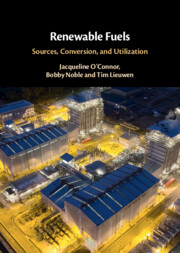Book contents
- Frontmatter
- Contents
- Contributors
- Preface
- Part I Users and Conversion Devices
- 1 Aero Gas Turbines
- 2 Ground-Based Gas Turbines
- 3 Reciprocating Engines
- 4 Process Heaters
- 5 Fuel Cells and Hydrogen Production
- Part II Chemical Energy Carriers
- 6 Syngas and Biogas
- 7 Liquid Fuel Synthesis
- 8 Ammonia
- 9 Metal Fuels
- 10 Bio-based Solid Fuels
- Part III Fundamental Combustion Processes
- 11 Fundamentals of Gaseous Combustion
- 12 Liquid Fuel Atomization and Combustion
- 13 Pollutant Emissions of Alternative Fuels
- Part IV Case Studies
- 14 Certification of Drop-In Alternative Fuels for Aviation
- 15 Fuel Composition Influences on Reciprocating Engine Performance
- 16 Near-Zero- and Zero-Carbon Fuels in Industrial Gas Turbines
- 17 Hydrogen Solutions for Net-Zero Power Generation
- Index
- References
17 - Hydrogen Solutions for Net-Zero Power Generation
Published online by Cambridge University Press: 01 December 2022
- Frontmatter
- Contents
- Contributors
- Preface
- Part I Users and Conversion Devices
- 1 Aero Gas Turbines
- 2 Ground-Based Gas Turbines
- 3 Reciprocating Engines
- 4 Process Heaters
- 5 Fuel Cells and Hydrogen Production
- Part II Chemical Energy Carriers
- 6 Syngas and Biogas
- 7 Liquid Fuel Synthesis
- 8 Ammonia
- 9 Metal Fuels
- 10 Bio-based Solid Fuels
- Part III Fundamental Combustion Processes
- 11 Fundamentals of Gaseous Combustion
- 12 Liquid Fuel Atomization and Combustion
- 13 Pollutant Emissions of Alternative Fuels
- Part IV Case Studies
- 14 Certification of Drop-In Alternative Fuels for Aviation
- 15 Fuel Composition Influences on Reciprocating Engine Performance
- 16 Near-Zero- and Zero-Carbon Fuels in Industrial Gas Turbines
- 17 Hydrogen Solutions for Net-Zero Power Generation
- Index
- References
Summary
The global push for economy-wide decarbonization is fueling intense interest in the potential of hydrogen as a zero-carbon resource. Long coveted as a fuel of the future, hydrogen already is being used in a variety of applications to cut carbon emissions across the globe. This chapter details a case study from Mitsubishi Power in use of hydrogen in gas turbines to produce electricity. Currently, Mitsubishi Power’s largest and most advanced gas turbines make use of a dry low-NOx (DLN) combustion system that allows operation with up to 30% hydrogen in baseline configuration. Going forward, increasing the use of hydrogen as a percentage of a power station’s fuel mix – from a mixture of around 30% hydrogen all the way up to 100% hydrogen as an energy source – requires the need for innovative equipment modifications, such as a multi-cluster combustor.
Keywords
- Type
- Chapter
- Information
- Renewable FuelsSources, Conversion, and Utilization, pp. 544 - 561Publisher: Cambridge University PressPrint publication year: 2022
References
- 1
- Cited by

